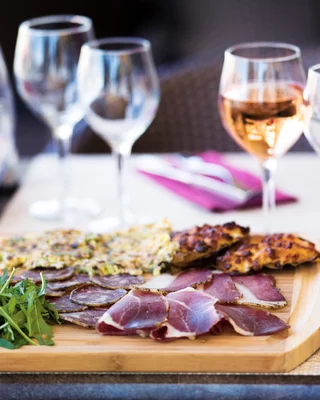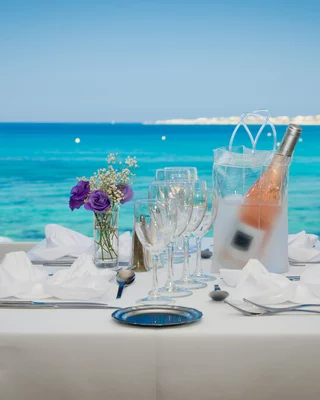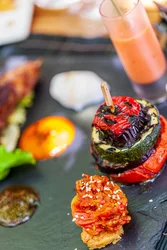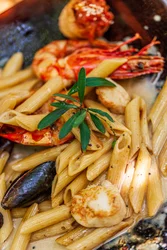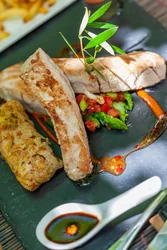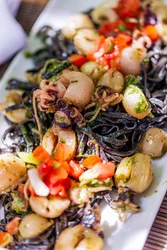Traditional Corsican gastronomy
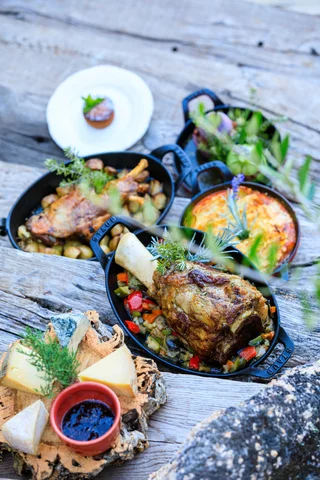
As well as being famous for its wonderful landscapes, Corsica is also a benchmark for Mediterranean cuisine! Corsican gastronomy, where family customs and traditions play an integral part in the preparation of every meal. Featuring local produce, some recipes are specific to particular events (family reunions, traditional feasts...).
The island's gastronomy is distinguished by the wild aromatic plants that titillate your nostrils! You've probably heard of them: the famous "herbes du maquis". And let's not forget Corsican charcuterie and goat's and sheep's cheeses: delicious as an aperitif, accompanied by Corsican wines! These local products illustrate the unique identity of the Isle of Beauty.
Corsican cuisine: original recipes
With a cuisine that combines rusticity, quality and generosity, a stay in Corsica's gastronomic tradition will take you on a voyage of discovery of many different local specialties. A diversity that blends tastes and flavors in delicious and surprising harmony.
As an aperitif, for example, brocciu awakens the appetite when accompanied by a dry white Corsican wine! Let yourself be seduced by the delicate flavor of a herbed tart accompanied by a full-bodied wild boar stew. For dessert, flavors range from bitter to sweet, depending on the season. Try fiadone (similar to lemon-flavored cheesecake), frappes(cousins of bugnes or oreillettes), canistrelli, panette (Corsican brioche) or chestnut fondant.
The originality of the products used in Corsican cuisine also contributes to its identity. Chestnuts, for example, are unique to Corsican cuisine. Growing all over the island, they are eaten roasted or boiled. Chestnut flour can also be incorporated into sweet or savory dishes. However, you'll mainly find it used as flour in cakes, flans, pancakes, polenta, etc.
If Corsican products are highly prized, you can also count on game from which charcuterie is made! In this land of hunters, traditional Corsican gastronomy also includes game recipes. These traditions continue to this day, both inland and on the coast. In addition to wild boar "U cignale", blackbirds are also part of Corsican cuisine. They are usually served as pâtés, kebabs or in sauce. Some regions also offer thrush, roast partridge and wood pigeon salmis. We recommend that you order Corsican bouillabaisse in the fishing ports. Don't hesitate to try it - you'll be pleasantly surprised!
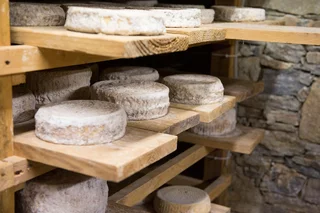
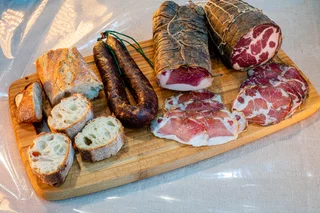
What's the typical Corsican dish? The history of regional specialities
As a very Christian land, life's events in Corsica are often accompanied by typical meals for the perfect celebration. Each region adds its own special touch, depending on the local produce available.
At Easter, on Good Friday, it's chickpea soup with garlic and lasagne, or cod stew with white beans. Fougasse is available in Bonifacio. On Easter Sunday, the tradition is to eat a delicious, tender, oven-roasted cabri or lamb! Dessert is "campanile", sweet bread flavored with aniseed and brandy. Catholic families follow an age-old culinary tradition: the cod dish.
At Christmas, a real bonfire is lit in front of the village church: the "Rocchiu". Gathering and piling up the logs is the task devolved to the village children on the eve of the 24th. Once the huge pyre was consumed, the still-warm ashes were collected by the villagers to heat their homes. At table, a plate was always added, the "u piattu di u puvarettu" or poor man's plate. A small snack is offered after midnight mass, usually consisting of grilled figatelli, zucchini fritters (fritelle), roasted chestnuts and fiadone.
A hearty Christmas meal begins with a tasting of mullet eggs. You can also opt for scrambled eggs with sea urchins, prisuttu or coppa. The main course is roast lamb and polenta accompanied by a delicious red wine. Dessert is a chestnut Yule log or "Ceppu di Natale Castagniu", and at the end of the meal, Christmas oranges are handed out to the children.
At weddings in Corsica, veal is usually served on a spit to the sound of guitars and Corsican songs. A grand aperitif dinner of brocciu fritters, frappes and salads welcomes guests. The meal can be a cold buffet featuring a variety of Corsican charcuterie, cold meats and salads. In addition to doughnuts and cakes for dessert, the traditional "pièce montée" of choux is cut with a saber!
Food with local produce on the table
Many producers and farm inns in Corsica offer quality local produce. For example:
Olive oil or "Oliu di Corsica".
Corsica produces top-quality olive oil, which is an integral part of traditional Corsican cuisine. Its golden color and great finesse make it a highly appreciated and sought-after oil by connoisseurs. Protected by an appellation d'origine contrôlée (AOC), it offers different aromas depending on the ripeness of the olives at harvest: grassy, artichoke, fresh almond or apple aromas, or rather, black olive, hay, dried fruit or maquis flower aromas.
Honey from Corsica, Mele di corsica
Produced and harvested in the Corsican mountains, Corsican honey is becoming scarce with the recurrent periods of drought. Honey has almost become a luxury product, yet beekeeping is part of the island's traditions. Combining tradition and modernity, Corsican honey offers a wide variety of tastes and flavors characteristic of true authentic products.
The world of Corsican charcuterie
Traditionally made by hand, Corsican charcuterie is part of the Corsican diet and culture. Produced from pork, it includes salamu or sausage, coppa, lonzu, panzetta and prisuttu, and figatellu, a liver-based product that can be eaten fresh or dried. These cheeses have made Corsican gastronomy famous.
Corsican cheeses made from sheep's milk
"Niolu", "Venacu", "Calinzana", "Brocciu"... After Corsican charcuterie, these traditional cheeses are a must on Corsican tables, usually produced in farm inns. Come and taste the local production and appreciate the know-how of these small producers who are as passionate as they are friendly! Traditional production methods handed down from generation to generation.
Corsican wines
Recognized in some cases on an international scale, Corsican wines are the pride of the small and large wineries scattered across the island of Beauty. And each region has its own grand cru and vintage! Corsica's geographical diversity favours the variety of its wines. In Corsica, there are seven Appellation d'Origine Contrôlée (AOC) terroirs: Patrimonio, Ajaccio, Calvi, Cap Corse, Porto-Vecchio, Sartène and Figari. An eighth appellation, the "Vins de Corse" AOC, covers other areas.
A distinction is made between
- Red wines are generally powerful, perfect for accompanying traditional game dishes, meat in sauce and aperitifs with cold meats.
- Fruity whites go well with seaside specialties: shellfish dishes, fish soups and grilled fish!
- Rosé wines are more suited to sunset aperitifs!
- Cape muscats are also very famous, and have been awarded an AOC (protected designation of origin).
If you like beers and liqueurs, your palate will welcome them as pleasant surprises.
Pietra and chestnut tours or gourmet restaurants
We hope this overview of traditional Corsican gastronomy has whetted your appetite! Plan your trip to Corsica with Corsicatours now. As ecotourism travel specialists, our advisors will design the perfect tailor-made gastronomic tour to make the most of your stay in Corsica. Would you like to take a wine tour in Corsica or a cookery course? Talk to us now about your plans!
Program: Start your day with a breakfast of delicious, crispy canistrelli and sheep's milk yoghurt, offering an explosion of authentic flavors right from the start. At lunchtime, a natural sweet wine, Muscat du Cap Corse, accompanies a traditional lean ham, which literally melts in your mouth. Let yourself be enchanted by the subtle aromas and delicate nuances of this perfect marriage. For dinner, let yourself be tempted by wood-grilled meat imbued with the unique flavor of traditional Corsican cooking, with chestnut flour polenta, this regional specialty transports you to the heart of the island's culinary traditions. Finish the feast with a hard cheese, such as the famous Chèvre de Sartène, for a final touch of deliciousness and authenticity. And to round off the day in style, a few crispy doughnuts will delight your taste buds, offering a sweet and comforting touch to complete your Corsican culinary experience.


